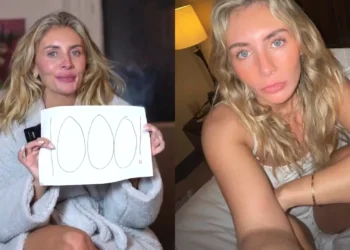Looking at other people’s Instagram, it can be easy to feel envious of their lives. It seems as if everyone else is constantly relaxing by pools, eating gourmet food and wearing designer clothes. But according to former Instagram model Ascenta O’Neil, it wasn’t as easy as it looks.
While we might take a quick snap of our lunch and post it to Instagram, that isn’t enough to maintain a massive following. O’Neil alleged that she spent at least 50 hours per week working online. That’s more than many people work at their full-time jobs!
She spent hours upon hours answering questions from fans, sharing her workouts, creating videos for YouTube and taking those perfect Instagram pics. At the end of the day, spending so long crafting the perfect image left O’Neil feeling less than fulfilled.
It’s hard to feel like your authentic self when you are only presenting carefully cultivated content to your legions of fans. Because it was necessary for her job, O’Neil found herself being addicted to spending time online.
She was constantly checking social media and doing everything in her power to maintain and expand her approval, social status and appearance. Luckily, she realized the impact social media was having on her life and happiness before it was too late.
One of the many ways in which people become famous on Instagram is sharing their diet and fitness programs. Fitness models on Instagram seem like they’re getting paid to be in great shape. So it’s hard for outsiders to see a drawback. But this can be dangerous not just for the models but for fans as well.
Samantha Lego was a college student who decided to try a fitness plan called the bikini body guide. These workouts were promoted by personal trainer Kayla Itsines. At first Lego loved the result she got, but was haunted by the comparison to other women on Instagram.
While she felt her body tone, she became devastated she hadn’t achieved the six-pack abs she kept seeing on social media. Her obsession with staying in shape and living up to Instagram standards eventually led her to developing an eating disorder.
Fitness culture on Instagram claims to promote health, but it can have the opposite effect psychology. Professor Dr. Marika Pigman found that even briefly browsing Instagram had a negative impact on self-esteem.
Many people particularly women struggle with unhealthy eating practices and attitudes towards their bodies. In many cases, Instagram fitness models only exasperate these problems rather than provide an inspiration.
When we look at photos in a magazine, we know editors have used professional models and Photoshop to ensure everyone looks impossibly pristine. Despite the inspiring messages we’re constantly seeing, images of ultra fit bodies can make us feel bad about her own state.
One common defense is that fitness models are trying to promote health, but sometimes losing weight and gaining abs isn’t an indicator of good health. In most cases, photos only capture a single moment and timing can be staged to look unrealistically good and perfect.
Victoria of fit body guides shocked her fans by posting a photo of her stomach in a relaxed state. Psychologists believe that rather than inspiring us to do better in many cases, these Instagram fitness models just end up making us feel bad about our bodies.
For most of us, getting free stuff seems like a dream come true. It’s no secret many companies pay popular Instagram users to promote their products. But getting free stuff in the mail isn’t as exciting as it seems and it can actually be rather depressing.
Sponsors want people to make it seem as if they use their products casually in everyday life. Not only can this be tricky to pull off without alienating your fan base, but it feels incredibly disingenuous. You are basically lying to your fans in order to make it seem as if you use a product and hope this will convince them to buy it.
Being Instagram famous means creating a brand for yourself and carefully cultivating your content. That’s a lesson that Christelle Lim knows all too well. She’s an extremely successful social media brand ambassador and she isn’t afraid to say no to product placement.
Reportedly, she walked away from a $1 million offer because the product didn’t fit with the image she was trying to cultivate. Turning down such a huge amount of money might seem insane to most of us, but imagine how much money Christelle Lim must make if she has that option.
A lot of people enjoy mocking selfie culture, but getting the perfect selfie is something you need to have. Many fans love seeing pictures of spontaneous scenes but most of the time they’re actually anything but famous selfie.
Queen Kylie Jenner has mastered the art of the perfect selfie. She takes advantage of natural light and is sure to head outside at 4:45 every evening to snag a selfie in the remaining sunlight.
We’re used to seeing her with the face full of makeup, but according to Kylie, she only does this for photoshoots. She admitted that the makeup techniques used for Instagram don’t typically translate well in the real world and look far too heavy-handed. This means all of those amazing looks you see on Instagram are purely for purpose of looking great in a selfie.
Read: 10 girls who resemble Kylie Jenner.
It’s pretty much the epitome of being all dressed up with nowhere to go. It may seem silly, but another huge part of getting the perfect selfie is figuring out which pose and angle works best for you. This takes a ton of practice and although the result is a great photo, it’s also in a natural one validation.
For many people who are Insta-famous, this guilty pleasure becomes a potentially dangerous obsession. Anna Russell started an Instagram account to keep in touch with friends, but soon it blew up bigger than she could have imagined. It led to a modeling contract with American Eagle Outfitters and then her online popularity exploded.
But the bigger she got, the more she struggled to deal with her fame. At first, getting a few likes and comments made Russell feel good about herself, but eventually that just wasn’t enough anymore. She felt an intense pressure to get even more of a reaction from fans.
She came to crave attention and this meant stressing out about having the perfect body, the perfect image and the perfect life documented on Instagram. Soon, getting feedback on social media became the only way in which Russell could feel good about herself. It became essential to her happiness and she began to increasingly crave it.
This is an unhealthy obsession that many people have trouble breaking out of context. Many people who are famous on Instagram like to create the illusion that they’re just sharing their extraordinary life, but the reality is most Instagram pages are more of a highlight reel than an accurate depiction.
Social media is a way to create the perfect light we wish we had instead of showing off the mundane one.









